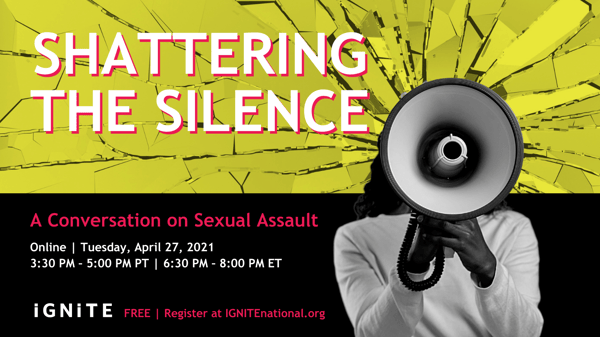Nora Gallo is a Leader on Fire

Content warning: Sexual assault Nora is the co-Executive Director for The Every Voice Coalition and anti-sexual violence and trauma activist. Since joining the Every Voice Coalition, Nora has been able to seek personal justice as a survivor by using her voice to advocate for all survivors' justice. In honor of her work supporting survivors to find their voice, IGNITE has selected Nora as a Leader on Fire for Sexual Assault Awareness Month 2021.
The Every Voice Coalition is a student-led coalition including students, survivors, advocates, and experts who believe that more needs to be done to make our campuses safe for all students. Working with the support of our partners including It’s On Us, End Rape on Campus, and Know Your IX, Every Voice bills have now been passed in two states, New Hampshire and Massachusetts, and filed in three more: Connecticut, Hawaii, Illinois. Today, more than 180,000 supporters have signed on in support of the Every Voice legislation. Students across the country agree: every voice should be heard.
Q&A with Nora
What do you want us to know about your story that we can't find on the website?
My promise in this work is always my own vulnerability and transparency through my leadership and friendship.
My journey began halfway through college when I was stepping into the advocacy realm. Advocacy was a vehicle to transform my trauma and to dive into direct action, to be a catalyst for change. I was coming from a place where I was, frankly, very angry and very traumatized.
The opportunity to get involved in the Every Voice Coalition fell into my lap. I ran into a couple of girls, who are now my really good friends, at UMass Amherst, and they invited me to get involved. For me, that was my chance to restart my college experience, my career path, and my educational path. All these things had been pretty stagnant for a long time because of intimate partner violence and sexual violence that I had experienced.
College felt like a dead end until I was able to step into this space of post-traumatic growth where I was able to find my own resiliency and strength in my vulnerability. I found myself in this work because I found myself in the legislation that we were trying to pass after I was raped when I came forward to get help.
Your field of work is so multifaceted. How and why does EVC focus on the area central to your organization?
Every Voice Coalition’s focus in this work - and my specific area of passion - is legislation and policy. Specifically, because young people, students, particularly young women, and survivors, are not empowered to step into these rooms, to sit at these tables where the legislation, the laws, the policies, et cetera, are being shaped that will directly impact them. They are not there. They are not at those tables.
Every Voice Coalition wants to be able to flip that on its head and say young people need to be in those rooms. Young people need to be the ones drafting that policy, et cetera. And that is specifically state-level legislative reform because combating campus sexual violence on a macro scale must move beyond just the school-level policy change at the point that we're currently at. It must reflect broad, sweeping legislative state-level legislative reform through bills that are survivor-written and survivor-centered.
I personally focus on this type of work because advocacy has been an avenue for justice for me. I like to call it legislative justice: being able to ensure by law that what happened to me does not happen to others to the same extent.
What's your self-care plan? What advice do you have for others concerning self-care?
Grounding and self-care and self-preservation must be the foundation of this work. Without it, we burn out. We would no longer be able to feed the flame that keeps us committed to change-making. When I talk about that flame or the fire in this work, we cannot think of full-on destruction when we think of change-making because then we burn with it. It must be manageable. So self-care is a part of the passion that feeds that flame.
My therapist always tells me change in this space is a marathon, not a sprint. She says this every session to remind me that when I rest and take breaks for my own healing and my own joy, that is also activism. When your personal experiences and trauma are so close to the work you do day to day, you don't get to clock out. So it's what you do throughout your day and on your time off that grounds yourself in self-care and self-preservation that matters.
But for those of us, of course, who are close to that pain, it's hard for us to set those boundaries. So my advice would be that self-care requires routine and loving discipline, that self-care is a self-study of personal and interpersonal needs.
If you wrote a piece of legislation, what big structural change would you hope to tackle for survivors? Or to prevent/end sexual assault?
When it comes to legislation, Every Voice Coalition focuses on four components that we believe all students and survivors should have access to: resources, accommodations that are not contingent upon reporting through any formal avenues such as Title IX or in a legal investigation, transparency, and preventative measures.
We work on this from a non-carceral framework because the conversation is so focused on investigatory procedures, the adjudicatory process, Title IX, et cetera. When it comes to campus sexual violence, we want to remove ourselves from that. Instead, we focus on the needs of the ninety percent of survivors that don't come forward to report. All survivors need free access to legal, medical and counseling services on campus and then confidential advisory services that clarify survivors’ rates and options, an amnesty policy that protects survivors when they come forward to report.
We really want to look at what the roadblocks are to achieving justice through an adjudicatory or investigatory process. What can we offer survivors outside of that system? There's this whole other realm that we need to focus on. If fewer than half of all survivors are receiving counseling or supportive services, what are we doing to provide for those who are not? Student survivors should not only survive if they stay in college, they deserve to thrive through college.
Do you see any states that are really being trailblazers and leaders when it comes to legislation that centers the campus survivors?
Massachusetts and New Hampshire currently have all five of those components in law now going into effect. In 2016, Illinois passed the Preventing Sexual Violence and Higher Education Act, which outlines a lot of those components. There are other states where we are currently working but have not yet passed legislation, including Maine, Virginia, Pennsylvania, New Mexico, Nevada, Hawaii, and Connecticut.
What advice do you have for others who want to be part of the solution in ending all sexual assault?
So the first thing that I have to say may be a little bit controversial. We need to move beyond believing survivors. It's time we focus the attention on supporting survivors. Believing them or not shouldn’t even enter our minds. It should be a given, like breathing air.
Second, sexual violence is not an individual problem. It's a collective problem. This movement is inherently intersectional in who it impacts on the individual level but also the communities that it impacts. It must be addressed and approached as an intersectional issue.
Three, recognize and understand the impact of trauma on survivors. Sexual violence is a public health issue, sexual violence is endemic and trauma is a public health crisis.
We have to create space to understand how trauma can impact a survivor in every area of their life: personal, academic, health, career, and so on.
Do you ever see yourself wanting to seek a leadership position or see yourself running for office?
It's not out of the question. I'm between deciding on law school or pursuing a Ph.D. My goal and purpose are to write trauma prevention into policy, because if anything, policy has been traumatizing, and that trauma is a public health crisis and we need to do something to prevent that. We need people in office who are addressing that. We need people directly out of office who are doing research and shaping the policy. To do this work, I could run for office, I could become a lawyer, I could get my Ph.D. I could do all three.
What message would you like to send to survivors?
Wherever you are on your healing journey, you're valid. Your story is valid, your trauma is valid. No matter how many years down the line you are. In a world where we're often not believed, it's your truth that matters the most. And in a world where autonomy and choice are often stripped from us, I want us to be able to open doors to create options when it comes to us when it comes to achieving justice for ourselves.
Let's pay it forward - what are two or three other people/organizations working in this space that you admire and would recommend people learn more about?
- Cheyenne Taylor Jacobs, founder of She Should Speak
- Rep. Jeanné Kapela, Hawai’i State House Rep. for District 5
- The Iamempwr podcast hosted by Isa Bogart and Nina Randolph
Is there anything else you’d like to add?
We, survivors, should be empowered to get involved in politics by running for office or by getting engaged in efforts tangential to elected office, such as advocacy organizations that work within the legislative realm. If there's anything I've learned in advocacy, it's that women, both inside and outside of the system, are influencing policies, who have so much strength and so much power in creating change. So not only do we need women in office, but we need women directly out of office as well.
If you want to get involved in the Every Voice Coalition, email me DM me on Instagram, go to the contact form on our website. We are here to talk. Connections are very important for me. If you want to get involved, simply reach out.
Resources from Nora & the Every Voice Coalition
- Get to know the legislation
- Defining our issues: Sexual violence definitions
- Next Generation Leaders Fellowship
Where to find Nora
Where to find Every Voice Coalition
Resources
If you are in immediate need of support, call the National Sexual Assault Helpline.
They accept phone calls 24 hours a day at 1-800-656-4673.
A comprehensive list of services and resources is available at rainn.org.

